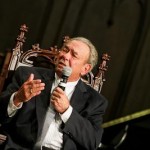Dr. James White: Today I was joined by Dr. Michael Kruger, President of Reformed Theological Seminary in Charlotte, such as Canon Revisited and The Question of Canon; he likewise contributed to and edited The Heresy of Orthodoxy and The Early Text of the New Testament. Our visit was prompted by a phone call made by a Lutheran to Catholic Answers Live back on 10/31/13. We played the entire call before the program started, and we played the heart of the call, where the Roman Catholic priest made the key assertions about canon and scriptural authority, during the interview with Dr. Kruger. We covered a wide variety of topics relevant to the canon issue. Truly one of the most useful programs we’ve ever done! Enjoy and learn!
Category Archives: Canonicity
Ten Basic Facts About The New Testament Canon
Mike Kruger, author of Canon Revisited: Establishing the Origins and Authority of the New Testament Books (Crossway, 2012) and the forthcoming The Question of Canon: Challenging the Status Quo in the New Testament Debate (IVP, 2013), has a helpful series on the New Testament canon, linked below, “designed to help Christians understand ten basic facts about its origins. This series is designed for a lay-level audience and hopefully could prove helpful in a conversation one might have with a skeptical friend.” Here are the ten facts he covers:
1. “The New Testament Books are the Earliest Christian Writings We Possess”
2. “Apocryphal Writings Are All Written in the Second Century or Later”
3. “The New Testament Books Are Unique Because They Are Apostolic Books”
4. “Some NT Writers Quote Other NT Writers as Scripture”
5. “The Four Gospels are Well Established by the End of the Second Century”
6. “At the End of the Second Century, the Muratorian Fragment lists 22 of Our 27 NT Books”
7. “Early Christians Often Used Non-Canonical Writings”
8. “The NT Canon Was Not Decided at Nicea—Nor Any Other Church Council”
9. “Christians Did Disagree about the Canonicity of Some NT Books”
10. “Early Christians Believed that Canonical Books Were Self-Authenticating”
Here’s a link to the links:
HT: Jastin Taylor
Norm of Norms and Without Norm
The just as the New Testament calls Christ the “King of kings” and “Lord of lords.” With this phrase, with or without the affirmation of other authorities. It is what it is whether it is acknowledged or not. Scripture alone is infallible; Scripture alone cannot err.
This is the major point of conflict between Rome and the Reformation, between Roman Catholicism and Christianity. Rome claims infallibility for the church as well as Scripture. In fact, Rome claims to have infallibly created the canon of Scripture. Protestants make no such claims. We know that we are fallible, from the lowest to the highest. We know that the possibility of error exists in everything we do, including — and this is troubling to many — the compiling of the canon of Scripture.
 On this issue, R. C. Sproul writes:
On this issue, R. C. Sproul writes:
How was the canon established? By whose authority? Is the canon closed to further additions?… Did the canon come into being by the fiat of the church? Was it already in existence in the primitive Christian community? Was the canon established by a special providence? Is it possible that certain books that made their way into the present canon should not have been included? Is it possible that books that were excluded should have been included?
We know that at least for a temporary period Martin Luther raised questions about the inclusion of the Epistle of James in the New Testament canon. That Luther once referred to James as an “Epistle of Straw” or a “right strawy Epistle” is a matter of record. Critics of biblical inspiration have not grown weary of pointing to these comments of Luther to argue their case that Luther did not believe in the inspiration or infallibility of Scripture. This argument not only fails to do justice to Luther’s repeated assertions of the divine authority of Scripture and their freedom from error, but more seriously it fails to make the proper distinction between the question of the nature of Scripture and the extent of Scripture. Luther was unambiguous in his conviction that all of Scripture is inspired and infallible. His question about James was not a question of the inspiration of Scripture but a question pf whether James was in fact Scripture.
Though Luther did not challenge the infallibility of Scripture he most emphatically challenged the infallibility of the church. He allowed for the possibility that the church could err, even when the church ruled on the question of what books properly belonged in the canon. To see this issue more clearly we can refer to a distinction often made by Dr. John Gerstner. Gerstner distinguishes between the Roman Catholic view of the canon and the Protestant view of the canon in this manner:
Roman Catholic view: The Bible is an infallible collection of infallible books.
Protestant view: The Bible is a fallible collection of infallible books.
The distinction in view here refers to the Catholic Church’s conviction that the canon of Scripture was declared infallibly by the church. On the other hand, the Protestant view is that the church’s decision regarding what books make up the canon was a fallible decision. Being fallible means that it is possible that the church erred in its compilation of the books found in the present canon of Scripture.
Continue reading
